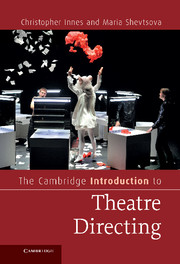Book contents
- Frontmatter
- Contents
- List of illustrations
- Acknowledgements
- Introduction
- Chapter 1 Traditional staging and the evolution of the director
- Chapter 2 The rise of the modern director
- Chapter 3 Directors of theatricality
- Chapter 4 Epic theatre directors
- Chapter 5 Total theatre: the director as auteur
- Chapter 6 Directors of ensemble theatre
- Chapter 7 Directors, collaboration and improvisation
- Notes
- Select bibliography
- Index
- References
Chapter 1 - Traditional staging and the evolution of the director
Published online by Cambridge University Press: 05 April 2013
- Frontmatter
- Contents
- List of illustrations
- Acknowledgements
- Introduction
- Chapter 1 Traditional staging and the evolution of the director
- Chapter 2 The rise of the modern director
- Chapter 3 Directors of theatricality
- Chapter 4 Epic theatre directors
- Chapter 5 Total theatre: the director as auteur
- Chapter 6 Directors of ensemble theatre
- Chapter 7 Directors, collaboration and improvisation
- Notes
- Select bibliography
- Index
- References
Summary
While this book focuses on the work of contemporary directors and the directorial principles that have become defined over the modern period, it is useful to see these in the historical context. This broad overview not only allows a sense of both aesthetic and political perspective, but also suggests the need for the functions and position of the theatre director by illustrating the varied figures who assumed less defined even if possibly similar roles in specific eras. In addition, it demonstrates a long connection between innovations in performance, challenging or pre-empting the standard stage practices of a given age, and the activities of directorial prototypes: a connection that has become one of the defining factors of the contemporary director.
Theatre practice in the Western world evolved from two main origins. Firstly: the theatre in Ancient Greece, which was passed down in adaptations through Classical Rome to the commedia dell’arte, and was reintroduced – although in a very different form – during the Renaissance. Secondly: the medieval tradition of religious plays and royal pageants. Even back then there were almost certainly influences that flowed between Europe and other traditions: the theatre of Ancient Greece may well have borrowed from Asian traditions, or contributed to them (with miniature amphitheatres still surviving, carved into the hillsides across Asia Minor), while there are striking similarities between Persian Ta’zieh performance and the medieval Mystery play. However there is so little documentation of such interchanges that – while in discussing contemporary directors the influence of the twentieth-century Chinese actor Mei Lang-fan on Meyerhold and Brecht or the two-way street of Roberto Ciulli’s ‘Silk Road’ are noted – this historical overview limits itself to the Western tradition.
- Type
- Chapter
- Information
- The Cambridge Introduction to Theatre Directing , pp. 6 - 35Publisher: Cambridge University PressPrint publication year: 2013



